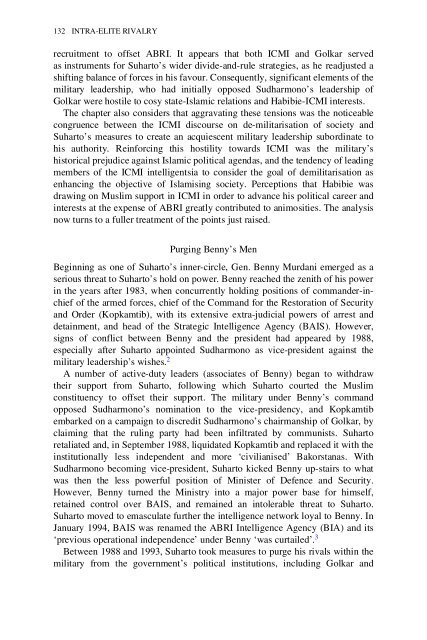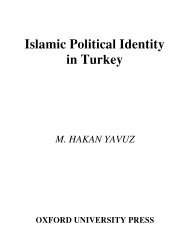You also want an ePaper? Increase the reach of your titles
YUMPU automatically turns print PDFs into web optimized ePapers that Google loves.
132 INTRA-ELITE RIVALRYrecruitment to offset ABRI. It appears that both ICMI <strong>and</strong> Golkar servedas <strong>in</strong>struments for Suharto’s wider divide-<strong>and</strong>-rule strategies, as he readjusted ashift<strong>in</strong>g balance of forces <strong>in</strong> his favour. Consequently, significant elements of themilitary leadership, who had <strong>in</strong>itially opposed Sudharmono’s leadership ofGolkar were hostile to cosy state-<strong>Islam</strong>ic relations <strong>and</strong> Habibie-ICMI <strong>in</strong>terests.The chapter also considers that aggravat<strong>in</strong>g these tensions was the noticeablecongruence between the ICMI discourse on de-militarisation of society <strong>and</strong>Suharto’s measures to create an acquiescent military leadership subord<strong>in</strong>ate tohis authority. Re<strong>in</strong>forc<strong>in</strong>g this hostility towards ICMI was the military’shistorical prejudice aga<strong>in</strong>st <strong>Islam</strong>ic political agendas, <strong>and</strong> the tendency of lead<strong>in</strong>gmembers of the ICMI <strong>in</strong>telligentsia to consider the goal of demilitarisation asenhanc<strong>in</strong>g the objective of <strong>Islam</strong>is<strong>in</strong>g society. Perceptions that Habibie wasdraw<strong>in</strong>g on Muslim support <strong>in</strong> ICMI <strong>in</strong> order to advance his political career <strong>and</strong><strong>in</strong>terests at the expense of ABRI greatly contributed to animosities. The analysisnow turns to a fuller treatment of the po<strong>in</strong>ts just raised.Purg<strong>in</strong>g Benny’s MenBeg<strong>in</strong>n<strong>in</strong>g as one of Suharto’s <strong>in</strong>ner-circle, Gen. Benny Murdani emerged as aserious threat to Suharto’s hold on power. Benny reached the zenith of his power<strong>in</strong> the years after 1983, when concurrently hold<strong>in</strong>g positions of comm<strong>and</strong>er-<strong>in</strong>chiefof the armed forces, chief of the Comm<strong>and</strong> for the Restoration of Security<strong>and</strong> Order (Kopkamtib), with its extensive extra-judicial powers of arrest <strong>and</strong>deta<strong>in</strong>ment, <strong>and</strong> head of the Strategic Intelligence Agency (BAIS). However,signs of conflict between Benny <strong>and</strong> the president had appeared by 1988,especially after Suharto appo<strong>in</strong>ted Sudharmono as vice-president aga<strong>in</strong>st themilitary leadership’s wishes. 2A number of active-duty leaders (associates of Benny) began to withdrawtheir support from Suharto, follow<strong>in</strong>g which Suharto courted the Muslimconstituency to offset their support. The military under Benny’s comm<strong>and</strong>opposed Sudharmono’s nom<strong>in</strong>ation to the vice-presidency, <strong>and</strong> Kopkamtibembarked on a campaign to discredit Sudharmono’s chairmanship of Golkar, byclaim<strong>in</strong>g that the rul<strong>in</strong>g party had been <strong>in</strong>filtrated by communists. Suhartoretaliated <strong>and</strong>, <strong>in</strong> September 1988, liquidated Kopkamtib <strong>and</strong> replaced it with the<strong>in</strong>stitutionally less <strong>in</strong>dependent <strong>and</strong> more ‘civilianised’ Bakorstanas. WithSudharmono becom<strong>in</strong>g vice-president, Suharto kicked Benny up-stairs to whatwas then the less powerful position of M<strong>in</strong>ister of Defence <strong>and</strong> Security.However, Benny turned the M<strong>in</strong>istry <strong>in</strong>to a major power base for himself,reta<strong>in</strong>ed control over BAIS, <strong>and</strong> rema<strong>in</strong>ed an <strong>in</strong>tolerable threat to Suharto.Suharto moved to emasculate further the <strong>in</strong>telligence network loyal to Benny. InJanuary 1994, BAIS was renamed the ABRI Intelligence Agency (BIA) <strong>and</strong> its‘previous operational <strong>in</strong>dependence’ under Benny ‘was curtailed’. 3Between 1988 <strong>and</strong> 1993, Suharto took measures to purge his rivals with<strong>in</strong> themilitary from the government’s political <strong>in</strong>stitutions, <strong>in</strong>clud<strong>in</strong>g Golkar <strong>and</strong>




